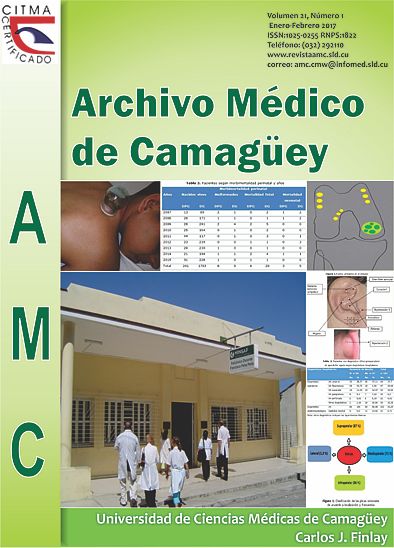Dyslexia, dysgraphia and dyscalculia: their impact on ecuadorean education
Abstract
Background: dyslexia, dysgraphia and dyscalculia are mental disorders that present an unfavorable situation in Ecuadorean educational system. They affect motivation, self-esteem and school admission. The teaching staff does not have knowledge to detect these problems in the students.
Objective: to offer some theoretical considerations about these difficulties in learning that affect school development.
Methods: a bibliographic search about the topic was conducted in databases Latindex, Scielo, Redalycs, and Hinari. Thirty two documents were found and among them 13 were used in which the topic research was tackled specifically. Data descriptors were used: dyslexia, dysgraphia and dyscalculia.
Results: it was determined that the students who present these mental disorders which affect learning are addressed as incompetent, inept and spoiled. Parents are blamed for their children’s poor results.
Conclusions: lack of interest in studying, low self-esteem and school leaving in this kind of student are one of the most remarkable consequences at all levels of teaching. Therefore, it deserves an immediate scientific response.
DeCS: DYSLEXIA; AGRAPHIA; DYSCALCULIA; LEARNING DISORDERS; REVIEW LITERATURE AS TOPIC.
Downloads
References
1. Ministerio de Educación [Internet]. Ecuador: Red social orientada a la educación en Ecuador; c2004-2016 [actualizado 12 May 2016; citado 8 Jun 2016]. Propuesta de la comunidad educativa como insumo para el nuevo Plan Decenal de Educación 2016-2025; [aprox. 180 pantallas.]. Disponible en: http://educacion.gob.ec/wp-content/uploads/downloads/2016/03/PLAN-DECENAL-PROPUESTA.pdf
2. Ministerio de Educación [Internet]. Ecuador: Red social orientada a la educación en Ecuador; c2004-2016 [actualizado 12 May 2016; citado 8 Jun 2016]. Educación inclusiva; [aprox. 3 pantallas.]. Disponible en: http://educacion.gob.ec/escuelas-inclusivas/.
3. Vázquez N, Salazar P. Alianza por la educación: Más allá de lo imaginado. Fondo de las Naciones Unidas para la Infancia y fondo Ecuatoriano Populorum y Progressio. Quito: Caja de Herramientas para la Inclusión Educativa; 2013.
4. Magaña M, Ruiz Lázaro P. 2004. Trastornos específicos del aprendizaje [Internet]. Madrid: Ergón; 2004 [citado 29 May 2016]. Disponible en: http://faros.hsjdbcn.org/adjuntos/415.1-Ps_inf_trastornos_especificos_aprendizaje.pdf
5. Ladislexia.net [Internet]. California: Asociaciones de Dislexia Internacionales; 14 Dic 2015 [actualizado 6 Jun 2016; citado 8 Jun 2016]. Alumnos con dislexia. ¿Qué hacer como docentes?; [aprox. 4 pantallas]. Disponible en: http://www.ladislexia.net/alumnos-con-dislexia/1999
6. Davis RD, Braum E. El don de la dislexia. Nuevo método para corregir la dislexia y otros problemas de aprendizaje. Madrid: Editex; 1999.
7. Saenz Andrade A, Viteri Burbano R, Velasco Abad M. La niñez y la adolescencia en el Ecuador contemporáneo: Avances y brechas en el ejercicio de derechos. Ecuador: Oficina de la UNICEF de Quito; 2015.
8. Ponce S. Tuning América Latina–Reflexiones y perspectivas de la Educación Superior en América Latina [Internet]. Madrid: Bilbao; 2007 [citado 29 May 2016]. Disponible en: http://www.interaprendizaje.com/index.php?option=com_content&view=article&id=136&Itemid=146
9. Cantón Mayo I. La dislexia: ¿Trastorno o cualidad por descubrir? Colombia: Editorial Universidad de Antioquia; 2013.
10. Anderson G. Las etapas del grafismo [Internet]. 29 Mar 2014 [citado 23 May 2016]; [aprox. 4 p.]. Disponible en: https://www.buenastareas.com/login.php?redirectUrl=%2Fensayos%2FDisgrafia%2F49680954.html&from=essay
11. Butterworth B. Dyscalculia Screener [Internet]. London: Butterworth; 2004 [citado 2016 May 23]; [abput 4 p.]. Available from: http://www.readingandspellingchannel.com/uploads/4/0/4/1/4041264/brianbutterworth-dyscalculia.pdf
12. Nelson N. Dyscalculia: Key facts for Parents [Internet]. New York: Editorial By T.R.E. Miles; 2011 [citado 2016 Jun 7]. Available from: http://www.mathematicalbrain.com/2011/pdf/NFER.pdf
13. Shalev RS, Gross-Tsur V. Developmental Dyscalculia. Pediatr Neurol [Internet]. 2001 May [citado 2016 May 29];24(5):[about 6 p.]. Available from: http://www.sciencedirect.com/science?_ob=ShoppingCartURL&_method=add&_eid=1-s2.0-S0887899400002587&originContentFamily=serial&_origin=article&_ts=1466106825&md5=3e4246bac4355b4d93006032799833ed
Published
How to Cite
Issue
Section
License
Copyright (c) 2017 Aldo Jesús Scrich Vázquez, Leticia Ruz Fonseca, Dayamí Bembibre Mozo, Iselkis Torres Céspedes

This work is licensed under a Creative Commons Attribution-NonCommercial 4.0 International License.
Copyright: Camagüey Medical Archive Magazine, offers immediately after being indexed in the SciELO Project; Open access to the full text of the articles under the principle of making available and free the research to promote the exchange of global knowledge and contribute to a greater extension, publication, evaluation and extensive use of the articles that can be used without purpose As long as reference is made to the primary source.
Conflicts of interest: authors must declare in a mandatory manner the presence or not of conflicts of interest in relation to the investigation presented.
(Download Statement of potential conflicts of interest)
The Revista Archivo Médico de Camagüey is under a License Creative Commons Attribution-Noncommercial-No Derivative Works 4.0 International (CC BY 4.0).
This license allows others to distribute, to mix, to adjust and to build from its work, even for commercial purposes, as long as it is recognized the authorship of the original creation. This is the most helpful license offered. Recommended for maximum dissemination and use of licensed materials. The full license can be found at: https://creativecommons.org/licenses/













 22 julio 2025
22 julio 2025